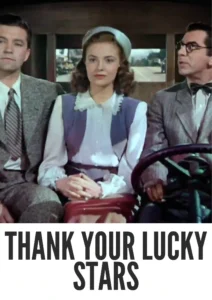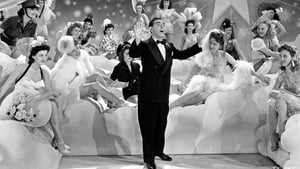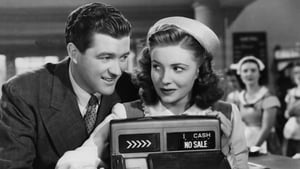Contact: info@alwanfilm.com
Video Sources 0 Views
- Watch trailer
- Thank Your Lucky Stars


Synopsis
Table of Contents
ToggleReview: Thank Your Lucky Stars 1943 Colorized – A Star-Studded Musical Extravaganza

Introduction
Thank Your Lucky Stars, released in 1943, is a delightful musical comedy directed by David Butler that brings together some of Hollywood’s biggest stars for a heartwarming and entertaining showcase. Filled with catchy tunes, dazzling dance numbers, and plenty of comedic hijinks, this star-studded extravaganza is a true delight for audiences of all ages. In this review, we’ll dive into the glitz and glamour of Thank Your Lucky Stars and explore its enduring charm.
Check The Full Colorized Movies List
Check Our Colorized Movies Trailer Channel
Understanding Thank Your Lucky Stars 1943 Colorized: Director, Cast, and Genre
Directed by David Butler, Thank Your Lucky Stars features an all-star cast that includes such luminaries as Eddie Cantor, Dennis Morgan, and Joan Leslie. The film falls within the musical comedy genre, known for its infectious songs, lively dance routines, and feel-good storylines.
Exploring the World of Thank Your Lucky Stars 1943 Colorized: Plot and Characters
Thank Your Lucky Stars follows the efforts of a group of entertainers who come together to stage a charity show to support the war effort during World War II. Along the way, they encounter a variety of colorful characters, engage in comedic mishaps, and ultimately deliver a performance that lifts the spirits of all who attend.
The Art of Film Colorization
While Thank Your Lucky Stars was originally filmed in black and white, its early colorized version adds a new layer of vibrancy to its musical numbers and lavish costumes. The colorization process enhances the film’s visual appeal and brings to life the dazzling spectacle of its musical sequences.
Early Colored Films: A Brief History
The history of early colored films is marked by innovation and experimentation as filmmakers sought to enhance the visual appeal of their movies. From hand-tinted frames to pioneering technicolor processes, the evolution of colorization techniques transformed the cinematic landscape, offering audiences a new way to experience the magic of the silver screen.
Thank Your Lucky Stars (1943) and Its Early Colored Version
The decision to release Thank Your Lucky Stars in a colorized format was made with the intention of immersing audiences in the vibrant world of its musical numbers and lavish production design. While some purists may prefer the original black and white version, the early colorized edition of Thank Your Lucky Stars adds a new layer of visual splendor to its already dazzling spectacle.
The Debate Over Film Colorization
The debate over film colorization continues to divide audiences and industry professionals alike. While some argue that colorization breathes new life into classic films and makes them more accessible to modern audiences, others maintain that it compromises the artistic integrity of the original work. As technology advances and filmmaking techniques evolve, the debate over colorization remains a topic of ongoing discussion within the film community.
Examining Thank Your Lucky Stars (1943) as an Early Colored Film
Viewing Thank Your Lucky Stars in its early colorized iteration offers audiences a fresh perspective on its musical numbers and lavish production design. The colorization process enhances the film’s visual appeal and brings to life the vibrant world of its wartime entertainment. As viewers are transported back to the golden age of Hollywood, they are treated to a visual feast that celebrates the magic of song and dance.
Influence and Legacy: Thank Your Lucky Stars 1943 Colorized’s Impact on Cinema
Thank Your Lucky Stars is a shining example of Hollywood’s ability to uplift and entertain audiences during times of adversity. Its infectious songs, lively dance numbers, and star-studded cast have left an indelible mark on the musical comedy genre, inspiring countless imitators and cementing its status as a beloved classic of the silver screen.
Director’s Cinematic Legacy: Beyond Thank Your Lucky Stars 1943 Colorized
David Butler’s directorial legacy extends far beyond Thank Your Lucky Stars, encompassing a diverse body of work that includes acclaimed films such as Calamity Jane and By the Light of the Silvery Moon. As one of the most versatile filmmakers of his generation, Butler was known for his ability to craft entertaining and uplifting stories that resonated with audiences of all ages. Thank Your Lucky Stars stands as a testament to his talent and creativity, solidifying his reputation as a master of musical comedy.
Themes Explored in Thank Your Lucky Stars 1943 Colorized
At its core, Thank Your Lucky Stars celebrates the power of music and entertainment to bring people together and lift their spirits during difficult times. Through its infectious songs, lively dance numbers, and heartwarming storyline, the film offers a joyous celebration of camaraderie, creativity, and the indomitable human spirit.
Reception and Controversy Surrounding Thank Your Lucky Stars 1943 Colorized
Upon its release, Thank Your Lucky Stars received widespread critical acclaim for its infectious songs, lively dance numbers, and star-studded cast. While the decision to release the film in a colorized format sparked debate among purists, its enduring popularity has cemented its status as a beloved classic of the musical comedy genre.
Where to Watch Thank Your Lucky Stars 1943 Colorized Online
For those eager to experience Thank Your Lucky Stars for themselves, the film is readily available on popular streaming platforms such as Amazon Prime Video, Google Play Movies, and iTunes. Whether viewed in its original black and white format or its early colorized iteration, Thank Your Lucky Stars offers a cinematic experience that is both heartwarming and visually stunning.
FAQs About Thank Your Lucky Stars 1943 Colorized
1. Is Thank Your Lucky Stars based on a true story?
No, Thank Your Lucky Stars is a fictional film that celebrates the power of music and entertainment to uplift and inspire audiences during difficult times. While the film’s storyline may draw inspiration from real-life events, its characters and plot are works of fiction.
2. Who starred in Thank Your Lucky Stars?
Thank Your Lucky Stars features an all-star cast that includes such luminaries as Eddie Cantor, Dennis Morgan, and Joan Leslie. The film also includes cameo appearances by a host of other Hollywood stars, including Bette Davis, Errol Flynn, and Olivia de Havilland.
3. What is the central message of Thank Your Lucky Stars?
At its core, Thank Your Lucky Stars celebrates the power of music and entertainment to bring people together and lift their spirits during difficult times. Through its infectious songs, lively dance numbers, and heartwarming storyline, the film offers a joyous celebration of camaraderie, creativity, and the indomitable human spirit.
4. Why was Thank Your Lucky Stars released in a colorized format?
The decision to release Thank Your Lucky Stars in a colorized format was made with the intention of immersing audiences in the vibrant world of its musical numbers and lavish production design. While some purists may prefer the original black and white version, the early colorized edition of Thank Your Lucky Stars adds a new layer of visual splendor to its already dazzling spectacle.
5. What is the legacy of Thank Your Lucky Stars?
Thank Your Lucky Stars is widely regarded as a beloved classic of the musical comedy genre that continues to entertain and inspire audiences of all ages. Its infectious songs, lively dance numbers, and star-studded cast have left an indelible mark on cinema, shaping the way musicals are made and appreciated to this day.
6. Are there any sequels or remakes of Thank Your Lucky Stars?
No, there have been no official sequels or remakes of Thank Your Lucky Stars. However, the film’s enduring popularity has inspired countless imitators and tributes in various media. Nonetheless, none have captured the infectious energy and star-studded spectacle of the original 1943 classic.
7. Where can I watch Thank Your Lucky Stars online?
For those eager to experience Thank Your Lucky Stars for themselves, the film is readily available on popular streaming platforms such as Amazon Prime Video, Google Play Movies, and iTunes. Whether viewed in its original black and white format or its early colorized iteration, Thank Your Lucky Stars offers a cinematic experience that is both heartwarming and visually stunning.
Conclusion
In conclusion, Thank Your Lucky Stars (1943) is a delightful musical comedy that celebrates the power of music and entertainment to uplift and inspire audiences during difficult times. Whether viewed in its original black and white format or its early colorized iteration, the film offers a joyous celebration of camaraderie, creativity, and the indomitable human spirit. As viewers are transported back to the golden age of Hollywood, they are treated to a visual and auditory feast that continues to entertain and inspire audiences of all ages. Thank Your Lucky Stars remains a beloved classic of the musical comedy genre that continues to delight and enchant audiences around the world.












